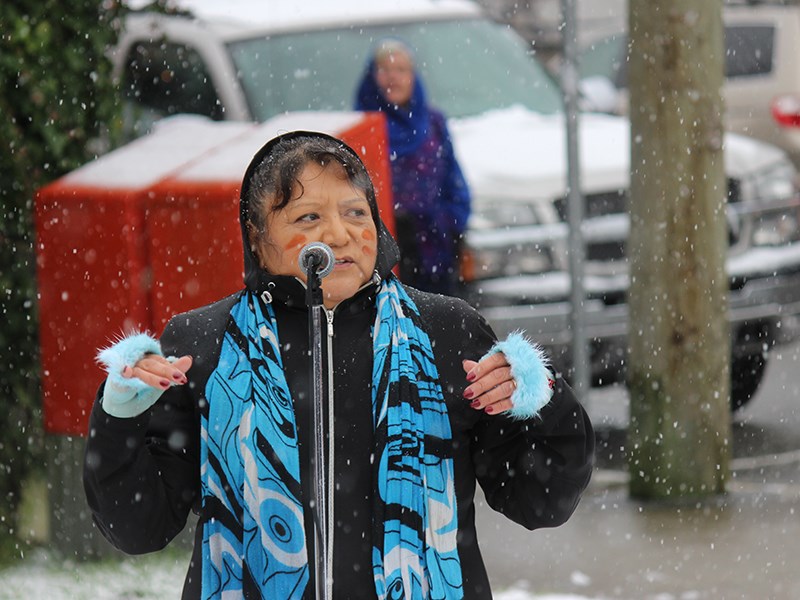A group of protesters in Powell River gathered at noon in the snow on Tuesday, January 8, joining hundreds of similar actions against an LNG pipeline.
The protests, held across Canada and the United States, followed the arrest of 14 activists by RCMP on Monday, January 7.
Under the banner Day Of Action For Unist'ot'en And Gidimt'en: Powell River, the protesters stood in solidarity with the hereditary chiefs of the Wet'suwet'en, who are opposed to gas pipelines running through their traditional territory.
The Unist'ot'en clan was the first to set up a checkpoint in 2009, followed by Gidimt'en in December 2018. Both clans are part of Wet'suwet'en Nation.
RCMP, enforcing a Supreme Court injunction, made the arrests at the Gidimt'en checkpoint in a remote area of Northern BC. The injunction was granted to a subsidiary of TransCanada Corp, Coastal GasLink, as work begins on the $6.2 billion pipeline that will carry fracked gas from Dawson City to Kitimat.
In Powell River, protesters sang, drummed and heard from people involved in the environmental movement in Powell River and indigenous citizens from Tla’amin Nation, including Cyndi Pallen, who said the protest brings awareness about what's happening in society and how it is impacting first nations people.
“Many people are suffering in many ways due to the land and resources and the water with the pipelines going in and fracking that's taking place,” said Pallen. “It's depleting everything in our society.”
Wet'suwet'en leadership is not united in opposing the pipeline. The elected chief and council were among first nations signatories supporting the pipeline project, but Wet'suwet'en hereditary chiefs are opposed.
“Everybody comes from a different place. You walk differently. You think differently. It's not surprising that there are people out there who think that way also,” said Pallen. “My dad always said, ‘you can have all the money in the world, if we don't have the land where are we going to be at? What's going to happen to us?’”
Meanwhile, in a statement, North Island-Powell River MP Rachel Blaney said the Wet’suwet’sen blockade reflects serious concerns. She said she was disappointed that prime minister Justin Trudeau is remaining silent.
“The government does a lot of talk about reconciliation, but that means showing up and doing the tough work, especially in difficult situations,” said Blaney. She added that if Trudeau is serious about his commitments to indigenous peoples, he needs to help facilitate a peaceful resolution that respects the rights of the Wet'suwet'en Nation.
“I am calling on the federal government to engage with the Wet'suwet'en,” said Blaney, “and demonstrate prime minister Trudeau’s commitment to real and meaningful reconciliation.”



